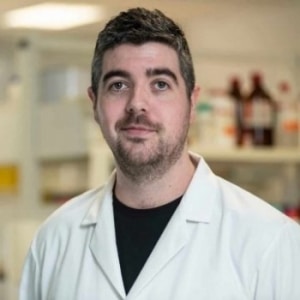Tell us a bit about yourself – what stage of your PhD are you in and what’s your project about?
I am a third (and final) year PhD student and my PhD spans the fields of Microbiology and Pharmacy here at Ulster University. My project aims to develop a novel method of delivering antibiofilm compounds (in my case a group of phytochemicals known as furanones) directly to an infected wound bed. The delivery system I am working with currently is a novel polymer aerogel that I designed as part of my work. It’s an important process that many people don’t think about too much. For many active compounds that are used in treating patients it isn’t just a simple matter of applying them directly to a site. They have to be delivered to a patient in a controlled manner rather than applying one large dose all at once.
What does a typical day or week look like for you?
My typical week can be pretty varied, That is one advantage of being split between disciplines. Some weeks I will be in the microbiology labs growing, treating and measuring bacterial biofilms on the new wound infection model I am working on. Some weeks I will be working in our Pharmacy labs making drug loaded aerogels or tweaking the formulation to optimise the drug release or physical properties of the gels. It’s really nice to have that variety and it can be a big help if I am getting frustrated with one experiment in particular I can go and work on something completely different for a while to clear my head.

What’s one thing that you’ve enjoyed the most during your PhD?
This might sound strange to some people but the best times I have had during my PhD are when it has gone wrong. I really enjoy the problem solving aspect of the PhD and when things go wrong I find it incredibly satisfying to work through the issue methodically and come up with a completely novel or really simple solution that works perfectly.
What’s been the most challenging part of it?
I think the most challenging part of my PhD so far came very early on, within the two months and involved having to become well versed with a technique I had never even heard of let alone had any experience with. I was originally working with a totally different type of polymer delivery system for my compounds and in order to characterise them I was using a technique called oscillatory rheology (the study of how soft materials react to having fores applied to them). It involved a LOT of physics and I was very much out of my depth but by breaking the topic down and working trough it I was able to get up to scratch fairly quickly. It is an aspect of a PhD that a lot of people don’t consider and it catches people out. You will almost certainly be faced with topics or protocols you have no experience with and it’s not like undergraduate classes where you are taken by the hand and shown each step. You will be expected to learn about it, learn the theory, learn the practice and then optimise all the methods yourself and this can take a long time. If you know and expect that it will make life much easier.
Where do you see yourself 5 years after completing your PhD?


What’s one piece of advice that you’d offer students that are thinking of doing a PhD?
It may seem like obvious advice but I would say to make absolutely sure that you want to do it. A PhD can be a very trying time and your work can be some of the most frustrating work you’ll do. Being passionate about the project and wanting to see it succeed can be the only thing that gets you through the stress and long days. If you aren’t really bothered about the project then it becomes very easy to just give up and not stay an extra hour in the evening to retry that experiment or to come in early so you can prep for the day. If you are considering a PhD be very very sure you willing to ride out the harder periods so you can enjoy the good bits.
What makes your university a good place to study?

I have really enjoyed my time at Ulster University so far. The researchers in my departments are all top notch and incredibly knowledgeable on their topics. But unlike a lot of other researchers and supervisors they don’t micromanage every aspect of your project and they are happy to give the PhD researchers the freedom to take things in a new direction. For me that has been really important. I think picking a university you’ll be happy to work in is almost as important as picking a project you’ll enjoy.
What do you enjoy doing in your free time?
Outside of lab I am a big fan of music and I spend a lot of my free time playing my guitar. I also enjoy cooking and will have a go at cooking pretty much anything (with varying degrees of success I admit!).
Want to know more about Chris?
Follow him on Twitter using the link below. Also check out his review article to learn more about furanones:

